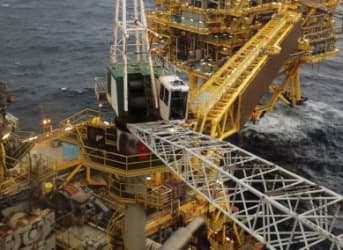Beggars can’t be choosers, but if you’re working with a Russian oligarch it’s best to exercise caution. At least that’s the opinion of the United Kingdom’s Department of Energy and Climate Change, who now intends to block the purchase of North Sea oil and gas assets by Mikhail Fridman and his Luxembourg-based LetterOne investment vehicle.
The saga began more than two years ago, when Fridman and his consortium sold their share of TNK-BP to Rosneft for nearly $14 billion. That money would form the seed capital for LetterOne. Approximately one year ago, L1 Energy – a division of LetterOne – agreed to purchase RWE AG’s Dea oil and gas unit, which, valued at $7.1 billion, contains assets in the UK, Germany, and the North Sea. The purchase – LetterOne’s first – received approval from the European Union, Germany, Norway, and ostensibly the UK.
Britain has since reneged – two days after LetterOne formally bought the assets. Per energy secretary Ed Davey, the investment group has seven days – a deadline of March 11 – “to explain why the secretary of state should not now proceed to issue notices under the licenses to require further changes of control.” Related: EU Energy Union Could Start In The North Sea
Underscoring his concern is the North Sea’s continued rapid decline – production slipped 1.1 percent in 2014 and is down a total of 70 percent since its peak in 1999. The Dea UK assets are of reasonably significant importance to reversing that trend. Comprising between 3 to 5 percent of the UK’s annual gas production, or roughly 1.1 billion cubic meters, the gas discoveries are among the largest presently under development in the UK. The fields are in close proximity to Central European markets and possess an already mature system of pipelines and transportation infrastructure.
The asset grab, or perhaps redistribution, is not what Fridman was expecting when entering the struggling UK market, but such is the reality currently facing the Russian oligarch and his troupe of mostly western executives.
Unlike so many of his contemporaries, Fridman, of Ukrainian descent, has largely avoided politics or any explicit ties to either side of the Ukraine conflict – though he did recently attend the funeral of slain opposition politician Boris Nemtsov. As a result, Fridman has thus far avoided the crosshairs of EU and US sanctions – and, with his wide net of business interests, it’s likely he will continue to do so. Still, fear persists in the UK and Davey is unconvinced that existing protections in the deal will prevent a production stoppage if sanctions are indeed handed down to Fridman or one of his business partners. Related: Russia Is Not Bluffing With Turkish Stream Project
For clarity, if sanctioned within the next year, the Dea assets will be transferred back to RWE, who can then engage other buyers. Such safeguards were lacking when BP and the National Iranian Oil Company agreed to jointly develop the Rhum gas field in 2005.
Working from the other side of the sanctions – and with far less scrutiny – ExxonMobil has continued to invest in its future, which it plainly believes lies in Russia. In 2014, Exxon increased the area of its Russian oil exploration leases to 63.7 million acres, or more than four times the company’s holdings in the US. Projects in the Laptev and Chukchi Seas join those in the Kara and Black Seas, where Exxon works with Rosneft. It’s a long-term play, betting on short-term sanctions.
Davey, on the other hand, is under more immediate pressure. As such, his decision lacks a firm grip on reality, especially considering the price-inflicted pullbacks from BP and Sinopec-Talisman among others. Fridman and LetterOne are prepared to take a chance on the North Sea, but Davey is not ready to take one on them.
By Colin Chilcoat of Oilprice.com
ADVERTISEMENT
More Top Reads From Oilprice.com:
- Oil Industry Costs Will Come Down But How Fast?
- Next Wave Of North Sea Oil Could Deliver A Billion Barrels
- What Will 2015 Do For Peak Oil?


















